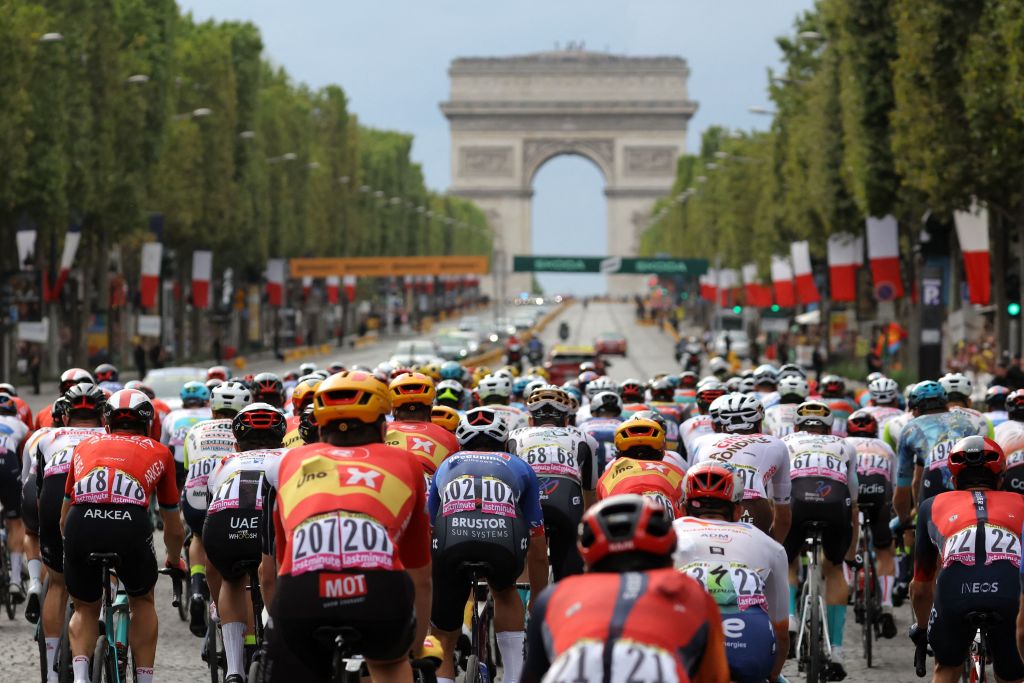WorldTour 2.0 - Expect One Cycling project to make small, covert steps in 2024
2024 season preview: Reforms must include all stakeholders and history shows that is always complicated

The latest race content, interviews, features, reviews and expert buying guides, direct to your inbox!
You are now subscribed
Your newsletter sign-up was successful
As the countdown to the 2024 season gathers pace, Cyclingnews looks at some of the key storylines that will define the coming year in cycling.
In October, during the announcement of the 2024 Tour de France route, a story emerged that eclipsed the ASO's annual presentation ritual in Paris.
The Reuters new agency broke news of a secretive project to create a 'superleague' in professional cycling spearheaded by Visma-Lease a Bike manager and AIGCP teams organisation president Richard Plugge, with possible and management backing from venture capitalist investors.
Cyclingnews understands the plan is to create some kind of new company within the sport that brings together teams, race organisers and the UCI to create new revenue streams. These would be through a variety of means: packaging broadcast rights of smaller races together, shared revenue with organisers, marketing athlete image rights, creating an e-commerce platform to sell team merchandise, and a digital platform for cycling content.
Other key ideas include creating a reduced, more selective race calendar that is more coherent and understandable to fans, and perhaps even the consideration of a salary or budget cap to level the playing field amongst teams.
The initially project first emerged in 2023 and called 'One Cycling' with the UCI involved. However the possibility of venture capital coming onboard and taking a stake in any 'new-co' business model has elevated the project to another level and raised far more concerns.
The name 'Champion's League' of cycling has also been mooted, in comparison to the successful European football tournament organised by the Union of European Football Associations (UEFA).
The latest race content, interviews, features, reviews and expert buying guides, direct to your inbox!
Any new calendar could see the Grand Tour remain as the biggest events in the sport, with the new One Cycling calendar built around them, much like in professional tennis.
Five leading WorldTour teams, including Ineos Grenadiers, EF Education-EasyPost, Lidl-Trek and Visma-Lease a Bike are said to be involved and pushing for the One Cycling reforms and venture capital involvement.
Reuters reports that accounting and consulting firm EY has sought expressions of interest from potential investors for the project. One well informed source told Cyclingnews that funding could even come from Saudi Arabia investors, as was the case with the LIV golf breakaway league. Reuters suggested that CVC Partners, the former owner of Formula One motor racing, could be interested in investing in the teams.
In 2021 CVC Capital Partners paid £365 million ($509 million) for a 14.3% stake in the Six Nations rugby tournament. Both EY and CVC Partners refused to comment to Reuters about the deal. Ineos Grenadiers also refused to comment.
Cyclingnews understands that the One Cycling project was presented at UCI WorldTour Seminar in Lausanne in December, but it sparked a heated debate between some team representatives and race organisers involved in the project, and senior people at Tour de France organiser ASO.
The WorldTour teams and other stakeholders such as rider associations who are not directly involved were also initially critical of the One Cycling project but have since been given further information after signing non-disclosure agreements.
It has been reported that the project is at a standstill but Cyclingnews understands that other meetings and conference calls have been held in recent weeks.
Plugge told Wielerflits that the goal is to launch the project at the start of the next WorldTour cycle in 2026, when new three-year race and team licences are awarded.
Any launch, even two years distant, will involve a busy calendar of behind-the-scenes work, trying to get race organisers on board – in particular, the Tour de France organisers ASO, who have been a thorn in the side of reform efforts for decades.
As owners of the sport's biggest, most recognised race which is the very foundation of pro road cycling, ASO wield enormous influence and effectively control the purse strings of the sport. Getting the recalcitrant French organisation on board will be key.
Plugge and friends will also have a hard time convincing smaller race organisers to accept a rotating calendar of inclusion in the WorldTour, which is one possible suggestion to condense the calendar.
One Cycling will also have to convince teams that their model will be worth the risk to sponsorships, which often depend on teams maximising their calendar for marketing return on investment.
Lastly, One Cycling faces the tremendous task of luring venture capital to infuse more funds into the sport when the sport can offer little if any return on investment.
At the moment, Saudi Arabia's Public Investment Fund (PIF) is the overwhelming leader in new sports investments with a fund of $500 billion, and one already rumoured to be a target for One Cycling.
The UCI and most teams have shown little reluctance to accept cash infusions from countries with questionable human rights records, and accusations of sports-washing would inevitably follow any deal with PIF or similar groups.
Finally, the UCI's efforts to reduce the WorldTour's carbon footprint will also be a factor in any major change to the sport, with President David Lappartient suggesting an overhaul of the WorldTour would include races following a more natural flow from region to region, to reduce the sports environmental footprint.
Pulling all these factors together will be a delicate balancing act. Plugge has come under intense criticism from rival team managers who find some of his actions to be a conflict of interest with the wider role of AIGCP president.
A huge power struggle is brewing in professional cycling, one that even eclipses the early days of the ProTour/WorldTour and the UCI's battles with the UCI.
When the UCI launched the ProTour in 2004, teams were sceptical, the the three Grand Tour organisers threatened to yank their races from the federation and hold their own "Grand Tour Trophy", and then-president Pat McQuaid faced years of heated debate and negotiation with them.
It all came to a head in 2007 when ASO used the betting sponsor Unibet as leverage against the UCI, fighting their required inclusion in the Tour de France under the guise of French laws against gambling advertising.
The snub led to the team's demise, and the struggle continued through 2008 when the ASO refused to admit Astana after the doping scandal of the previous year, and then put its races on under the sanction of the French federation, which led to all teams opting to leave the ProTour because the risk to sponsorship was too great.
The dust settled in 2010 with the creation of the WorldTour and compromises continued in recent years as the UCI, under Lappartient, agreed to take steps to limit the WorldTour to 18 teams and create the promotion/relegation system the ASO had been demanding for over a decade.
As 2024 gets underway, the same kind of intense debate and negotiation will undoubtedly happen behind closed doors. with the sport's fans again the last to find out about any changes, despite the fact that they also play a vital role in the sport.
One Cycling can only succeed if all of cycling's stakeholders benefit. Anything less is destined to generate resistance and cause someone to hit the brakes on professional cycling's global development once more.

Laura Weislo has been with Cyclingnews since 2006 after making a switch from a career in science. As Managing Editor, she coordinates coverage for North American events and global news. As former elite-level road racer who dabbled in cyclo-cross and track, Laura has a passion for all three disciplines. When not working she likes to go camping and explore lesser traveled roads, paths and gravel tracks. Laura specialises in covering doping, anti-doping, UCI governance and performing data analysis.
- Stephen FarrandEditor-at-large
